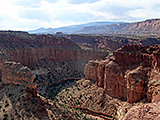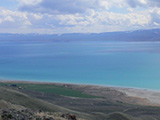Gwénaël Caravaca PhD thesis
 Depositional environments and bioconstructions in the Early Triassic of western USA
Depositional environments and bioconstructions in the Early Triassic of western USA
Defended on the 10th July 2017
Funding: Agence nationale de la recherche (“After” project)
Supervisors: Arnaud Brayard and Christophe Thomazo
Started in October 2014
Abstract
The Sonoma Foreland Basin (SFB, western USA) presents an excellent fossil and sedimentary record of the Early Triassic (~252-248 Ma), a critical period in the biotic recovery in the aftermath of the end-Permian amss extinction. Whilst the understanding of the paleogeographical framework of this basin is of prime importance in reconstructing then ecosystems, this latter is still poorly constrained up to now.
An original integrative study has therefore been done to characterize the controlling factors and the spatio-temporal evolution of the depositional settings present in the SFB. For that, a multi-scale and multidisciplinary approach was performed, using sedimentological, paleontological, geochemical, structural and geodynamical data.
 Integration of this diverse data allows to get a better understanding of the paleogeography of the SFB, which appears to be composed by two distinct sub-basins rather than one whole basin as previsouly thought. Also, this work hightlights multi-scale controlling factors (acting from local- to basin-scale) over the 4D evolution of the depositional settings, which in turn acts over the geobiological evolution of the basin.
Integration of this diverse data allows to get a better understanding of the paleogeography of the SFB, which appears to be composed by two distinct sub-basins rather than one whole basin as previsouly thought. Also, this work hightlights multi-scale controlling factors (acting from local- to basin-scale) over the 4D evolution of the depositional settings, which in turn acts over the geobiological evolution of the basin.
Keywords
Early Triassic, post-crisis recovery, Sonoma Foreland Basin, western USA, paleoenvironmental reconstructions, palinspastic reconstructions, structural evolution
Jury
A. Brayard, université de Bourgogne – supervisor
C. Thomazo, université de Bourgogne – supervisor
S. Bourquin, université de Rennes 1 – abstracter
F. Boulvain, université de Liège (Belgique) – abstracter
E. Vennin, université de Bourgogne – examiner
G. Escarguel, université Claude Bernard Lyon1 – examiner
M. Guiraud, université de Bourgogne – invited
- extrait:
- lien_externe:
- kc_data:
- a:8:{i:0;s:0:"";s:4:"mode";s:0:"";s:3:"css";s:0:"";s:9:"max_width";s:0:"";s:7:"classes";s:0:"";s:9:"thumbnail";s:0:"";s:9:"collapsed";s:0:"";s:9:"optimized";s:0:"";}
- kc_raw_content:
 Depositional environments and bioconstructions in the Early Triassic of western USA
Depositional environments and bioconstructions in the Early Triassic of western USADefended on the 10th July 2017
Funding: Agence nationale de la recherche ("After" project)
Supervisors: Arnaud Brayard and Christophe Thomazo
Started in October 2014
Abstract
The Sonoma Foreland Basin (SFB, western USA) presents an excellent fossil and sedimentary record of the Early Triassic (~252-248 Ma), a critical period in the biotic recovery in the aftermath of the end-Permian amss extinction. Whilst the understanding of the paleogeographical framework of this basin is of prime importance in reconstructing then ecosystems, this latter is still poorly constrained up to now.
An original integrative study has therefore been done to characterize the controlling factors and the spatio-temporal evolution of the depositional settings present in the SFB. For that, a multi-scale and multidisciplinary approach was performed, using sedimentological, paleontological, geochemical, structural and geodynamical data.
 Integration of this diverse data allows to get a better understanding of the paleogeography of the SFB, which appears to be composed by two distinct sub-basins rather than one whole basin as previsouly thought. Also, this work hightlights multi-scale controlling factors (acting from local- to basin-scale) over the 4D evolution of the depositional settings, which in turn acts over the geobiological evolution of the basin.
Integration of this diverse data allows to get a better understanding of the paleogeography of the SFB, which appears to be composed by two distinct sub-basins rather than one whole basin as previsouly thought. Also, this work hightlights multi-scale controlling factors (acting from local- to basin-scale) over the 4D evolution of the depositional settings, which in turn acts over the geobiological evolution of the basin.Keywords
Early Triassic, post-crisis recovery, Sonoma Foreland Basin, western USA, paleoenvironmental reconstructions, palinspastic reconstructions, structural evolution
Jury
A. Brayard, université de Bourgogne - supervisor
C. Thomazo, université de Bourgogne - supervisor
S. Bourquin, université de Rennes 1 - abstracter
F. Boulvain, université de Liège (Belgique) - abstracter
E. Vennin, université de Bourgogne - examiner
G. Escarguel, université Claude Bernard Lyon1 - examiner
M. Guiraud, université de Bourgogne - invited
